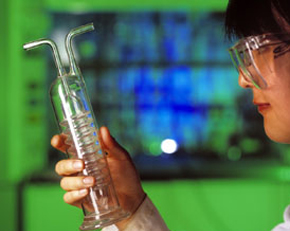Food Chemistry Degree
Food chemistry focuses on the chemical structure of food, how food deteriorates and how food can be improved for the consumer. Food chemistry applies the principals of chemistry to the developing, packaging, processing, preserving, storing and distribution of food, so that the food arrives to the consumers in a safe, economical and appetizing way.
A food chemistry degree involves the study of chemistry, biology, physics, biochemistry, microbiology, nutrition and engineering. A graduate with a food chemistry degree can find work in fields that strive to develop new and better foods and beverages, analyze heat processing methods; study the effects that processing food has on the foods appearance, taste, smell, freshness, and vitamin and mineral content. Food chemists also test food and drinks to make sure they meet the Food and Drug Administration’s labeling and safety requirements.
What Kind of Course Curriculum Does a Food Chemistry Degree Require?
Students enrolled in a food chemistry degree program will take all the standard courses required of chemistry degree students, which include courses in:
- General Chemistry
- Organic Chemistry
- Physical Chemistry
- Analytical Chemistry
- Inorganic Chemistry
- Biochemistry
Students will also take courses that will provide them the background knowledge they need to understand the basics of food chemistry. These courses may vary by program, but students should expect to take class in:
- Principle of food science
- Fundamentals of food engineering
- Food processing
- Food chemistry with lab
- Food microbiology with lab
- Food analysis
- Food product development
- Principles of human nutrition
- Sensory assessment of foods
What Kind of Concentrations are Available for a Food Chemistry Degree?
- Culinary Science- A culinary science focus combines the principles of the culinary arts and food science to provide students a science based education that enables them to obtain a B.S. in food chemistry after entering the program with a two-year culinary science degree. Students should consult with their school’s food chemistry program to determine if they offer a culinary science concentration.
- Food Safety- Prepares students who desire a career working in the food industry, specifically in the manufacturing, packaging, and distribution of food.
- Food Science and Technology- Prepares students who desire a career in industrial research and technological development. Schools that offer this type of concentration generally receive an accreditation from the Institute of Food Technologists.
Salary Expectations for Graduates with a Food Chemistry Degree
The median annual wage for chemists in 2008 were $66,230 a year according to the numbers compiled by the Untied States Bureau of Labor Statistics. The middle 50 percent earned between $48,000 and $89,000 a year, while the top 10 percent earned more than $113,000 a year. The starting salary offer for graduates with a bachelor’s degree in chemistry averaged $37,000 a year in 2009, according to the National Association of Colleges and Employers. The highest salaries were found in the federal executive branch and research and development. The bureau estimates an expected three percent employment growth for chemists in the job market between 2008 and 2018. Graduates who possess an advanced degree, especially those with PhDs, are expected to enjoy better job prospects working in research labs for larger pharmaceutical and biotechnology firms. Chemists held an estimated 84,000 jobs in the U.S. in 2008.

